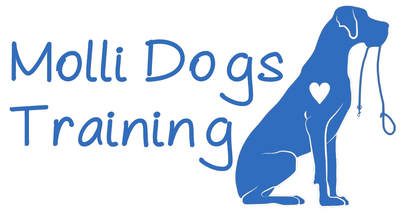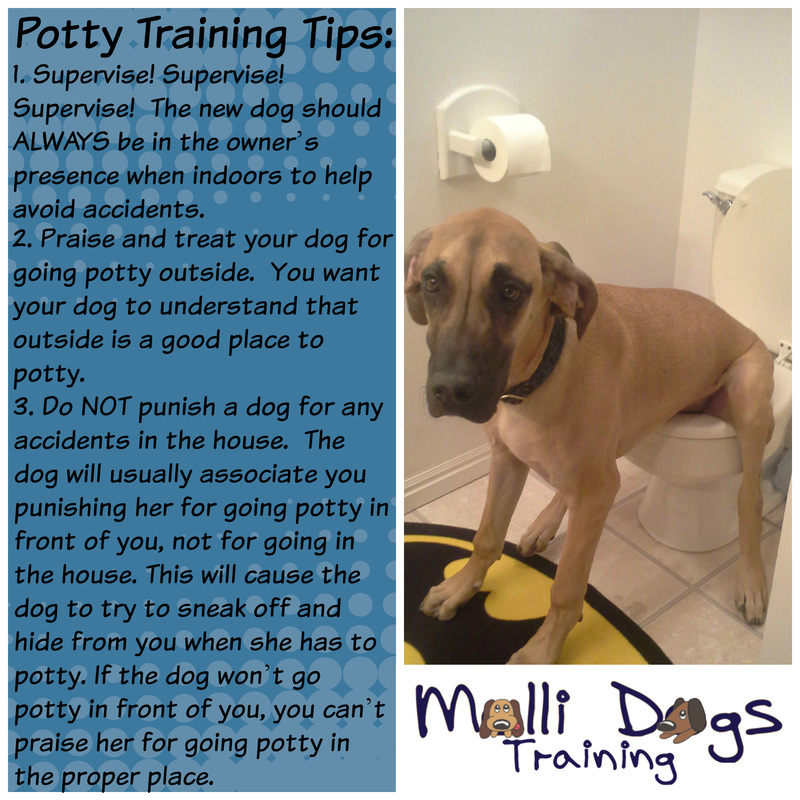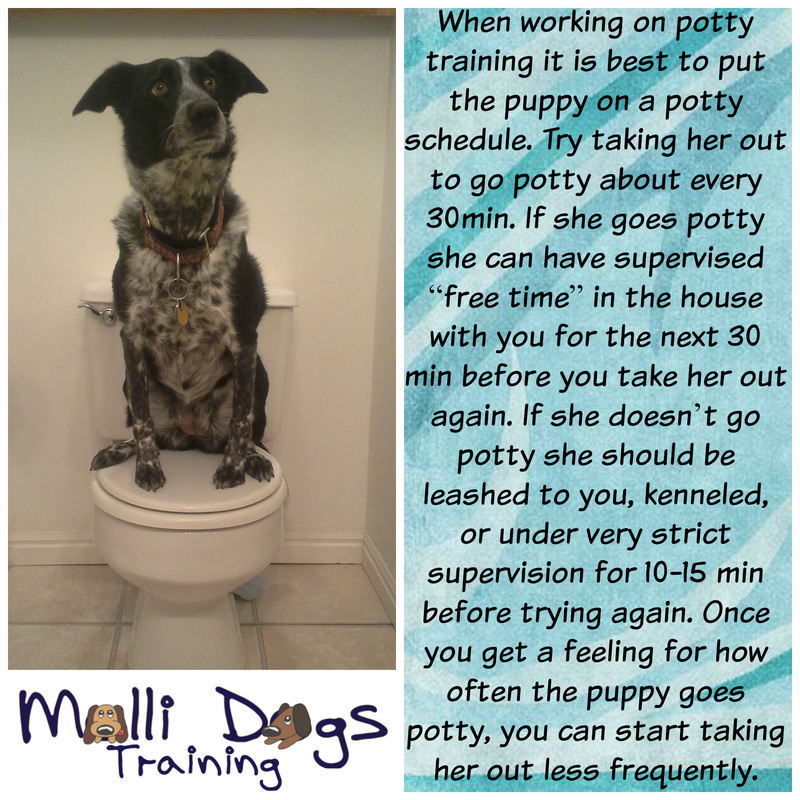Potty Training
- Supervision! Supervision! Supervision! Whenever the puppy is in the house free roaming she should be in the owner’s presence in order to help avoid accidents. If you cannot be actively supervising the puppy she should be in her kennel or in a puppy safe long term confinement area. This is a “puppy proof” area where there is nothing around that the puppy could potentially chew or destroy and will be easy to clean if the puppy has an accident (blocking off the kitchen with a baby gate or exercise pen can be a good option).
- Praise and treat your dog for going potty outside. You want your dog to understand that going potty outside is a good place to go.
- Put the puppy on a potty schedule. Take her out to go potty every 30-45min. If she goes potty she can have supervised “free time” in the house with you for the next 30-45min before you take her out again. If she doesn’t go potty she should be leashed to you or placed in a kennel for 10-20min before trying again. Repeat this process of taking the puppy out to go potty and then right back into the kennel until the puppy has gone to the bathroom. Once you get a feeling for how often your dog goes potty, you can start taking her out less frequently. Your puppy should only ever get supervised free time in the house if you know that she has gone to the bathroom. Absolutely no unsupervised free time until she has learned how to control herself better!
- Understand that most puppies do not have muscle control over their bladders until around 14 weeks of age. Just like an infant or young toddler, if the dog feels the need to go, she will go. Until this time you will be working on management and teaching your puppy where you want her to go potty. Once she has developed the muscle control to be able to start holding it the real potty training will begin!
- Do Not “punish” a puppy for any accidents in the house. The puppy will usually associate you punishing her for going potty in front of you, not for going in the house. This will cause the puppy to try to sneak off and hide from you when she has to potty, then you will find accidents in the house in random or hidden places. If the puppy won’t go potty in front of you, you can’t praise her for going potty in the proper place, and if you can’t praise her for going potty in the proper place, you can’t teach her where that proper place is. I once had a situation where rubbing a dogs nose in his accident caused him to think it meant his owners wanted him to eat it. This is why you don't want to punish a puppy for accidents. Simply rush your puppy to the correct place to go, then clean up the accident and move on.
- Be sure to clean up all accidents with a good odor neutralizer. Remember that just because you clean up the mess doesn’t necessarily mean the smell will be gone. If the dog can smell that she has gone potty there before, she will likely try to go there again. My favorite cleaner to use is Bissel Pet Stain Remover. Keep in mind that most of the common pet cleaners usually only work on hard floor. This is because accidents that occur on carpet and have the chance to sit, even just for a couple of minutes, will get down into the pad. Regular cleaners will get the accident out of the carpet, but leave it in the pad underneath.Vinegar and Baking Soda is the best way to clean up accidents on carpet. First, soak up what you can with a rag, then spray the area down really well with vinegar. Next, sprinkle the area with baking soda. The bubbling reaction will pull the accident up out of the pad. Once it has stopped bubbling use a damp cloth to scrub it up
- Keep your puppy on a feeding schedule. A puppy should only be going to the bathroom the number of times it is eating in a day, sometimes plus one. A puppy should be eating 3 times a day until it is at least 6 months old, so she should only be pooping 3-4 times a day. If she is going more than that there is a good chance that she may be sick or is not processing her food well and needs to be switched to a different kind. If you know when she is eating it will give you a much better idea of when she is going to need to go out.
- Take your puppy out to potty right after:
- She has been sleeping, napping, or resting
- Playing or running around
- Training
- Shortly after eating
- Right after or even during greetings
- Signs your puppy may need to go potty:
- Sniffing or Scratching
- Whining
- Circling
- Wandering or suddenly going to a corner or other room
- If your dog is having difficulty with potty training:
- Do not let her see you cleaning up accidents. This only draws unnecessary attention to it.
- Take the puppy out to potty through the same door every day.
- Try to keep daily feeding and sleeping schedules for the puppy the same.
- Keep your puppy on a watering schedule along with her feeding schedule. Provide her with water every 1 1/2 - 2 hours.
- Do not let your puppy have any food or water at least 2-3 hours before bed time.
- If you feel like your puppy knows where to go potty but is just not telling you when she needs to go, train her how to ring a bell to let you know when she needs to go out.
- You want your dog to be accident free for at least 10-14 days in a row before you start giving her free time in the house on her own. Typically I will do this only 1 or 2 rooms at a time. If you give your puppy access to the whole house right from day one it is setting her up for failure because she will just go find an out of the way corner or a room she doesn't go in much to go potty in. Use baby gates and exercise pens to block her from rooms she hasn't gained access to yet. Starting in the kitchen is usually the easiest since if she has accidents it will be easy to clean up there. Once she has gone 10-14 days accident free in that room, she gets access to the next room. She must then go another 10-14 days accident free in that room and so on until she has earned access to the whole house.
- Remember that even if you are doing everything correctly, the puppy/dog may still make mistakes (just like a child wetting the bed on occasion). Just take it in stride and continue working hard.


